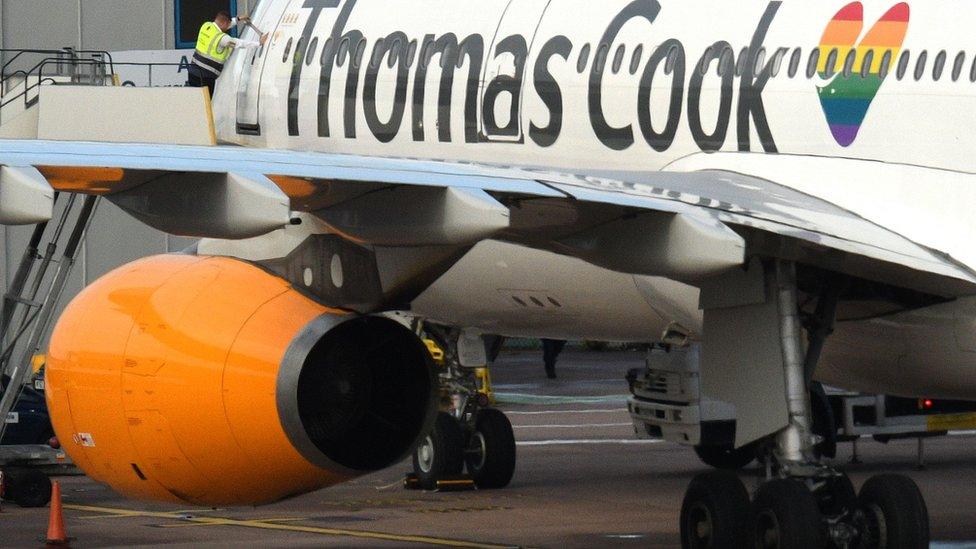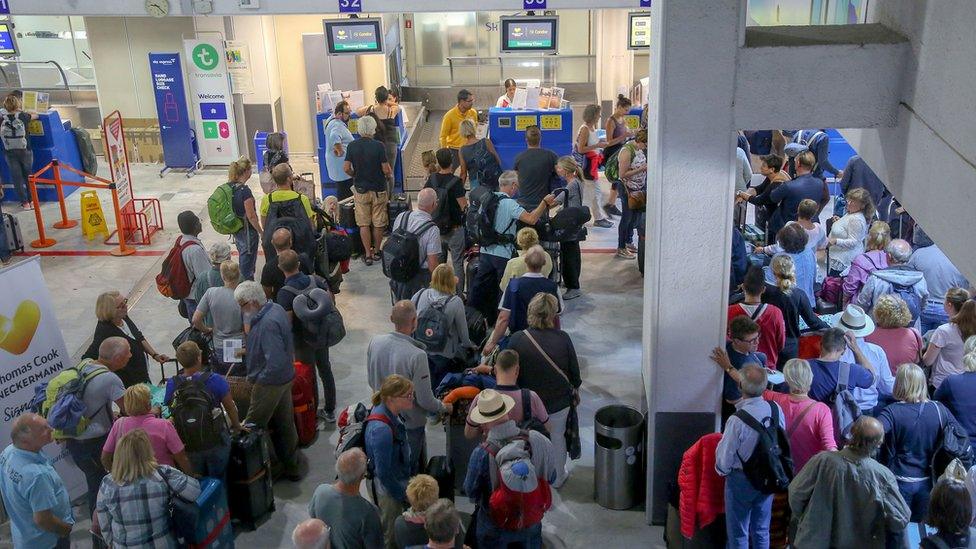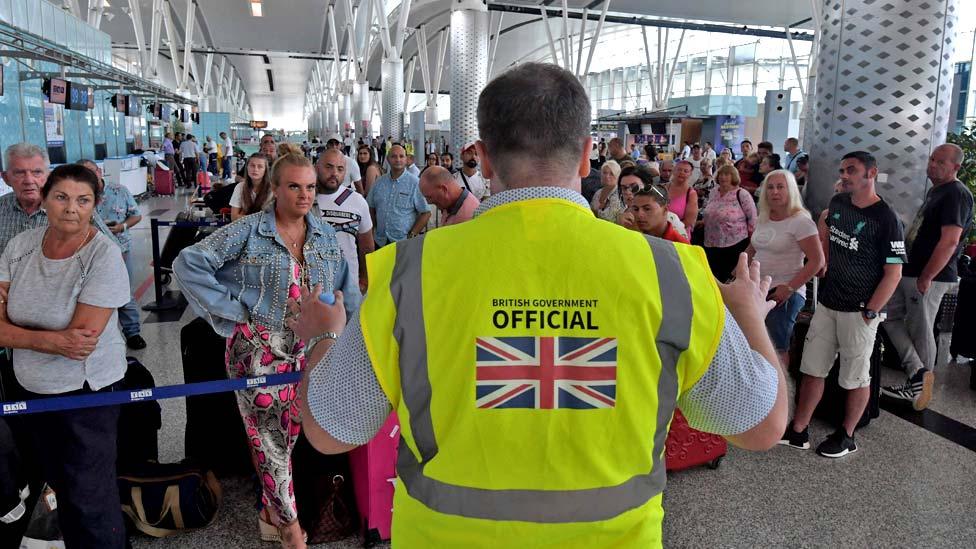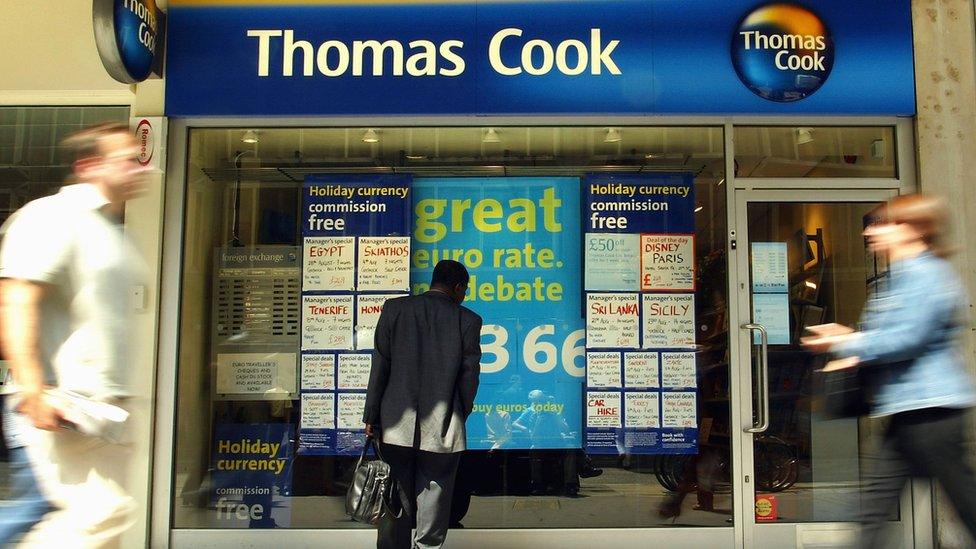Thomas Cook: How have overseas businesses been affected?
- Published

Thomas Cook operated holidays to over 60 destinations worldwide
The collapse of Thomas Cook could have an impact on tourism around the globe, concerned industry professionals say.
The oldest tour operator in the world was famous for its package holidays to more than 60 destinations.
In some of these countries – such as Spain, Greece and Turkey – there is a fear that tourist numbers could drop dramatically.
Thomas Cook's Chinese, German and Nordic subsidiaries continue to trade as normal, as does Thomas Cook India.
Spain was the company's main destination.
So far this year, more than 1.3 million passengers have travelled to Spain on Thomas Cook Airlines, external. That does not include a further 1.6 million passengers who travelled on Condor Airlines, in which Thomas Cook has a 49% stake. The airline says it is still operating.
The tourism sector in Spain's Balearic Islands faces millions of euros in losses.
Thomas Cook has a tax office in Palma with hundreds of employees, and also works with 20 hotels in the Balearic Islands and 20 in the Canary Islands.
José María Mañaricua, from the Federation of Hospitality and Tourism Entrepreneurs of Las Palmas, told El País that the collapse will have a "dramatic" impact on the Canary tourism sector.
'Fates depending on Thomas Cook'
Turkey's Hoteliers Federation (TUROFED) has warned that the country could miss out on up to 700,000 tourists a year due to the collapse of the tour operator.
According to official data, about 40 million tourists travelled to Turkey in 2018, bringing in $29.5 billion (£23.8 billion).

The chairman of TUROFED, Osman Ayik, told Reuters: "There are a large number of small businesses whose fates depend on Thomas Cook, especially in Mugla, Dalaman and Fethiye."
He added that some small hotels in Turkey are still owed around £100,000 – £200,000 ($125,000-$250,000).
Turkey's tourism ministry has said that it is working on extending a loan-based support package for the affected businesses.
There are currently 45,000 tourists in Turkey from the UK who booked through Thomas Cook.
'A big blow to the industry'
Goa, a winter holiday destination, was reliant on Thomas Cook charter flights which brought in about 2,000 tourists a week during October to March.
Thomas Cook customers react to holiday firm collapse
Savio Messias, president of the Travel and Tourism Association of Goa said: "Thomas Cook is a very reputed company, bringing in British tourists.
"British tourists are loved by the local Goans and the hotel industry. Thomas Cook has been operating for the last 25-30 years in Goa and losing out on Thomas Cook is a big, big, blow to the industry."
He added that several hotels face an uncertain future, external as they were entirely depending on Thomas Cook.
"It was a very good business which we are going to miss," Mr Messias said.
Hoteliers owed money
About 250,000 people travel annually to Cyprus with Thomas Cook, bringing an estimated €18.5 million (£16.3m, $20m), according to Cyprus' deputy tourism minister.
Savvas Perdios said that the loss for hoteliers and the wider economy is about €50 million. He added that hotels were owed money for July, August and even September.
Christos Efstathion, general manager of the Napa Plaza hotel told AFP news agency: "It's a big anxiety...it's not only the current guests, it's how to deal with the immediate, medium and long-term future for the hotel."
He added that the hotel had 300 room nights booked through Thomas Cook until the end of this month with an additional 700 in October.

Queues for the Thomas Cook counters in Crete on Monday
A further 50,000 tourists are stranded in Greece, according to the tourism minister.
Grigoris Tassios told local TV that hotels were expected to make losses on payments from the past two months.
He added that hotel companies would attempt to recover money from Thomas Cook in court.
"This is an earthquake on a scale of seven, now we are waiting for the tsunami," Michalis Vlatakis, president of the Association of Travel Agents of Crete said.
- Published23 September 2019

- Published23 September 2019
